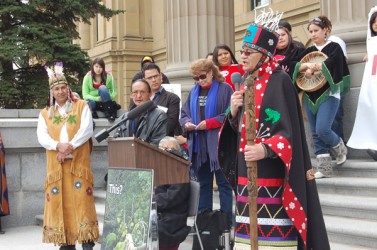Article Origin
Volume
Issue
Year
The message delivered to Enbridge, and its investors in a proposed pipeline project, couldn’t have been made any clearer.
“We informed them they were wasting their money; that we were never going to change our mind on the proposed project and they could better invest the money in better projects than what they are currently looking at because this one wasn’t going to go through following our traditional laws and our practices,” said Hereditary Chief Na’Moks (John Ridsdale) of Wet’suwet’en Territory in B.C.
Enbridge’s proposed route for the $5.5 billion Northern Gateway project will split the Wet’suwet’en territory in half. Wet’suwet’en is 22,000 square kilometres of unceded land in northcentral British Columbia. Enbridge is seeking approval for the pipeline, which will travel from Bruderheim, located northeast of Edmonton, to Kitimat in BC, and will carry 525,000 barrels of crude oil per day.
Presently a joint review panel is holding hearings in Alberta and British Columbia, seeking information from Aboriginal groups about how the proposed pipeline will impact their traditional ways of life and territories. A decision on the project is expected late next year.
Na’Moks was one of eight members of the Freedom Train invited to attend Enbridge’s annual shareholders meeting on May 9 in Toronto.
The 40-member strong Freedom Train, organized by the Yinka Dene Alliance, made its way across country, beginning in B.C., with stops in Jasper, Edmonton, Saskatoon and Winnipeg before ending up in Toronto.
At each location the group was met by enthusiastic supporters, people and vehicles lining the roadways at one and two in the morning to show their support.
Na’Moks recalls that on the way to Toronto, “one little old lady” stood in the early morning hours on the side of the road near a lakeside community holding a sign that read, “We support the Yinka Dene Alliance. Goodbye Enbridge.”
“I think she made the biggest impact on my heart,” he said, “to be there at daybreak all by herself.”
Na’Moks said he was less than impressed, however, with the answers to First Nations’ concerns offered up by Enbridge CEO Pat Daniel at the shareholders meeting. Freedom Train members were allowed to ask questions at the shareholder meeting. The group managed to deliver 16 or 18 questions. None of the answers provided by Daniel met with Na’Moks’ satisfaction.
“He constantly went back to the same thing he’s been telling us from day one, that he believes that the project is worthwhile for the investors,” said Na’Moks. “We weren’t really getting any decent answers.”
He said Daniel was pushed to provide information on which First Nations were in support of the Northern Gateway project, but he refused to provide that. Daniel announced that morning that the number had grown to 22 of the 45 communities along the route that had given their support. Enbridge is offering the First Nations a 10 per cent equity interest in the line.
“He said (to name the First Nations) is a violation of the agreement (they) have; that’s confidential,” said Na’Moks, “yet we’re very public about who’s opposed to it.”
The Freedom Train delegation was present when mutual fund company NEI Investments and two co-filers introduced a motion to spend more time assessing the risks to investors since opposition to the project was so vocal. The motion was defeated.
“I lined up again and let them know how disappointed I was in that; that if they really didn’t know (the opposition) they were facing, that their investors’ money was at risk,” said Na’Moks.
However, Na’Moks was pleased to be able to address the shareholders directly.
“Instead of them just reading it or seeing it on TV, I think that made a huge difference,” he said.
Na’Moks said the Freedom Train and its supporters delivered an important message, not only to Enbridge, Prime Minister Stephen Harper and the provincial governments, but also to the public.
“We let people know they have a voice … you need to talk to people face to face, eye to eye,” he said.
- 5770 views

